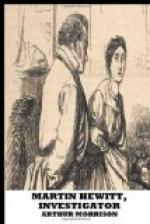“I beg pardon,” the first said. “Is this Hewitt’s Detective Agency Office?”
“Yes, I believe you will find it so,” the other replied. He was a stoutish, clean-shaven man, of middle height, and of a cheerful, round countenance. “You’d better speak to the clerk.”
In the little outer office the visitor was met by a sharp lad with inky fingers, who presented him with a pen and a printed slip. The printed slip having been filled with the visitor’s name and present business, and conveyed through an inner door, the lad reappeared with an invitation to the private office. There, behind a writing-table, sat the stoutish man himself, who had only just advised an appeal to the clerk.
“Good-morning, Mr. Lloyd—Mr. Vernon Lloyd,” he said, affably, looking again at the slip. “You’ll excuse my care to start even with my visitors—I must, you know. You come from Sir James Norris, I see.”
“Yes; I am his secretary. I have only to ask you to go straight to Lenton Croft at once, if you can, on very important business. Sir James would have wired, but had not your precise address. Can you go by the next train? Eleven-thirty is the first available from Paddington.”
“Quite possibly. Do you know any thing of the business?”
“It is a case of a robbery in the house, or, rather, I fancy, of several robberies. Jewelry has been stolen from rooms occupied by visitors to the Croft. The first case occurred some months ago—nearly a year ago, in fact. Last night there was another. But I think you had better get the details on the spot. Sir James has told me to telegraph if you are coming, so that he may meet you himself at the station; and I must hurry, as his drive to the station will be rather a long one. Then I take it you will go, Mr. Hewitt? Twyford is the station.”
“Yes, I shall come, and by the 11.30. Are you going by that train yourself?”
“No, I have several things to attend to now I am in town. Good-morning; I shall wire at once.”
Mr. Martin Hewitt locked the drawer of his table and sent his clerk for a cab.
At Twyford Station Sir James Norris was waiting with a dog-cart. Sir James was a tall, florid man of fifty or thereabout, known away from home as something of a county historian, and nearer his own parts as a great supporter of the hunt, and a gentleman much troubled with poachers. As soon as he and Hewitt had found one another the baronet hurried the detective into his dog-cart. “We’ve something over seven miles to drive,” he said, “and I can tell you all about this wretched business as we go. That is why I came for you myself, and alone.”
Hewitt nodded.
“I have sent for you, as Lloyd probably told you, because of a robbery at my place last evening. It appears, as far as I can guess, to be one of three by the same hand, or by the same gang. Late yesterday afternoon——”
“Pardon me, Sir James,” Hewitt interrupted, “but I think I must ask you to begin at the first robbery and tell me the whole tale in proper order. It makes things clearer, and sets them in their proper shape.”




